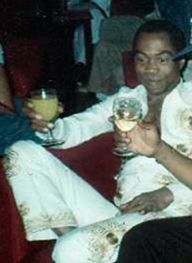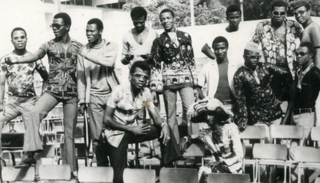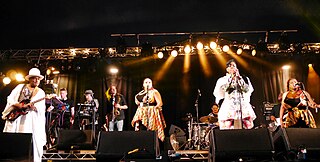Related Research Articles

Afrobeat is a West African music genre that involves the combination of West African musical styles from mainly Nigeria such as the traditional Yoruba and Igbo music and highlife with American funk, jazz, and soul influences. With a focus on chanted vocals, complex intersecting rhythms, and percussion. The style was pioneered in the 1960s by Nigerian multi-instrumentalist and bandleader Fela Kuti, who is most known for popularizing the style both within and outside Nigeria. At the height of his popularity, he was referred to as one of Africa's most "challenging and charismatic music performers."

Funk is a music genre that originated in African-American communities in the mid-1960s when musicians created a rhythmic, danceable new form of music through a mixture of various music genres that were popular among African-Americans in the mid-20th century. It deemphasizes melody and chord progressions and focuses on a strong rhythmic groove of a bassline played by an electric bassist and a drum part played by a percussionist, often at slower tempos than other popular music. Funk typically consists of a complex percussive groove with rhythm instruments playing interlocking grooves that create a "hypnotic" and "danceable" feel. It uses the same richly colored extended chords found in bebop jazz, such as minor chords with added sevenths and elevenths, and dominant seventh chords with altered ninths and thirteenths.

The music of Nigeria includes many kinds of folk and popular music. Little of the country's music history prior to European contact has been preserved, although bronze carvings dating back to the 16th and 17th centuries have been found depicting musicians and their instruments. The country's most internationally renowned genres are Indigenous, Apala, Aurrebbe music, Rara music, Were music, Ogene, Fuji, Jùjú, Afrobeat, Afrobeats, Igbo highlife, Afro-juju, Waka, Igbo rap, Gospel,Nigerian pop and Yo-pop. Styles of folk music are related to the over 250 ethnic groups in the country, each with their own techniques, instruments, and songs. The largest ethnic groups are the Igbo, Hausa and Yoruba. Traditional music from Nigeria and throughout Africa is often functional; in other words, it is performed to mark a ritual such as the wedding or funeral and not to achieve artistic goals. Although some Nigerians, especially children and the elderly, play instruments for their own amusement, solo performance is otherwise rare. Music is closely linked to agriculture, and there are restrictions on, for example, which instruments can be played during different parts of the planting season.

Fela Aníkúlápó Kútì, also famously known as Abàmì Ẹ̀dá, was a Nigerian musician, bandleader, composer, political activist, and Pan-Africanist. He is regarded as the King of Afrobeat, a Nigerian music genre that combines West African music with African-American funk and jazz. At the height of his popularity, he was referred to as one of Africa's most "challenging and charismatic music performers". AllMusic described him as "a musical and sociopolitical voice" of international significance.

Osibisa are a British-Ghanaian-Caribbean Afro-rock band founded in London in the late 1960s by four expatriate West African and three London based Caribbean musicians.

African popular music, like African traditional music, is vast and varied. Most contemporary genres of African popular music build on cross-pollination with Western popular music. Many genres of popular music like blues, jazz, salsa, zouk, and rumba derive to varying degrees on musical traditions from Africa, taken to the Americas by enslaved Africans. These rhythms and sounds have subsequently been adapted by newer genres like rock, and rhythm and blues. Likewise, African popular music has adopted elements, particularly the musical instruments and recording studio techniques of the Western music industry. The term does not refer to a specific style or sound but is used as a general term for African popular music.
Now-Again Records is a Los Angeles–based music imprint that specializes in reissues and compilations of funk, soul, and psychedelic rock from the 1960s to the 1980s. Founded in 2002 by Eothen "Egon" Alapatt as a subsidiary of Stones Throw Records, the organization has since grown into an independent label with a vast global catalog and its own roster of contemporary artists.
Afro rock is a style of rock music with African influences. Afro rock is a dynamic interplay between Western rock music and African musical elements such as rhythm, melodies and instrumentation. Afro rock bands and artists in the late 1960s and early 1970s included Osibisa, Assagai and Lafayette Afro Rock Band.

Pebbles is an extensive series of compilation albums in both LP and CD formats that have been issued on several record labels, though mostly by AIP. Together with the companion Highs in the Mid-Sixties series, the Pebbles series made available over 800 obscure, mostly American "Original Punk Rock" songs recorded in the mid-1960s — primarily known today as the garage rock and psychedelic rock genres — that were previously known only to a handful of collectors. In 2007, the release of the Pebbles, Volume 11: Northern California CD marked the final album in the Pebbles series. The following year, Bomp! marked the 30th anniversary of the original Pebbles album with a spartan, limited-edition, clear-vinyl reissue complete with the original pink cover insert.

Orchestre Poly-Rythmo de Cotonou is a band from Cotonou, Benin, originally active from the 1960s to the 1980s and founded by singer-guitarist Mélomé Clément. They reformed in 2009 to international recognition. Their work has mixed styles such as funk, afrobeat, psychedelia, jazz and local voodoo influences. The Guardian called them "one of West Africa's best dance bands."
Babá Ken Okulolo is a Nigerian bassist and bandleader who was first seen in the U.S. in 1985 with King Sunny Ade's world-touring band. He has played with renowned Afrobeat creator Fela Anikulapo Kuti, highlife master Victor Olaiya, and was a founder of the Afro-rock group Monomono in the 1970s. Now based in the San Francisco Bay Area, he leads four bands that represent his various musical specialties: Kotoja ; the Nigerian Brothers ; the West African Highlife Band ; and the Afro-Beat Connexion. Babá Ken has also headlined such venues as Lincoln Center, The Fillmore, The Warfield, LACMA, the Oakland Coliseum, Yoshi's, The Greek Theater, and the Great American Music Hall.

Sir Shina Peters is a Nigerian Jùjú musician.

Ebo Taylor is a Ghanaian guitarist, composer, bandleader, record producer and arranger focusing on highlife and afrobeat music.
The Funkees were a Nigerian afro-rock group formed in the late 1960s. They moved to London in 1973 and quickly gained prominence in the expatriate West African and West Indian music scene, but fragmented four years later. They specialized in funky, upbeat, highly danceable afro-rock that often featured lyrics sung in Igbo, as well as English. Originating as an army band after the Nigerian Civil War, they contributed to the outpouring of upbeat music produced by young people in Nigeria in response to the darkness of the recently concluded civil conflict. In 2012, Soundway Records reissued a compilation of their recordings from the mid-1970s, leading to a resurgence of interest in the band.
MonoMono was an afro rock band formed in Lagos, Nigeria in 1971 by Sierra Leone-born Joni Haastrup, Babá Ken Okulolo, and Danjuma "Jimi Lee" Adamu. Other members included Friday Jumbo and Candido Obajimi. They produced a handful of singles and three full length LP's. "Monomono" is Yoruba for "lightning". Their music combined afropop, soul, and British rock, delivered in jam format.
Abiodun Odukoya, better known as Abiodun, is a Nigerian-German singer, songwriter, producer and music arranger. Abiodun's name is of Yoruba origin and means "he who is born on a day of festivity". He is better known as the co founder of the Afro German music collective Brothers Keepers and as one of the pioneers of the German reggae, afro and soul music scene.

Psychedelic funk is a music genre that combines funk music with elements of psychedelic rock. It was pioneered in the late 1960s and early 1970s by American acts like Sly and the Family Stone, Jimi Hendrix, and the Parliament-Funkadelic collective. It would influence subsequent styles including '70s jazz fusion and the '90s West Coast hip hop style G-funk.

Ibibio Sound Machine is an English electronic afro-funk band from London. Formed in 2013, the band currently consists of vocalist Eno Williams, guitarist Alfred Kari Bannerman, percussionist Afla Sackey, drummer Joseph Amoako, bassist Philip PK Ambrose, trombonist/keyboardist Tony Hayden, trumpeter/keyboardist Scott Baylis and saxophonist/keyboardist Max Grunhard.
Olaolu Akintobi popularly known as Laolu Akins, is a Nigerian music producer who has worked with artists such as Shina Peters, Onyeka Onwenu, Adewale Ayuba, Mike Okri and Christy Essien-Igbokwe. He was the producer of Shina Peter's Ace and Shinamania "Dancing Time" " Experience" albums and Adewale Ayuba's Bubble "Play For Me" and several other albums as well as being the supervising producer of the maiden recording of P-Square titled "Where were you last night".

Orlando Julius Aremu Olusanya Ekemode, known professionally as Orlando Julius or Orlando Julius Ekemode was a Nigerian saxophonist, singer, bandleader, and songwriter closely associated with afrobeat music.
References
- ↑ Egon. "Egon's Favorite African Funk Reissues Of 2009". NPR . Retrieved 5 April 2020.
- 1 2 3 4 5 6 7 8 9 10 11 Ankeny, Jason. "Biography & History: Blo". AllMusic . Retrieved 5 April 2020.
- ↑ Klein, Alyssa. "1973 Nigerian Psych-Rock Blo 'Chapter One'". OkayAfrica . Retrieved 5 April 2020.
- ↑ Hunter-Tilney, Ludovic (27 December 2013). "Blo: Chapter One". Financial Times. Retrieved 5 April 2020.